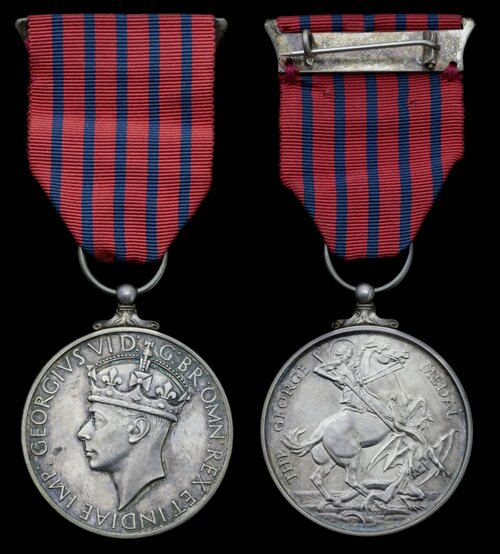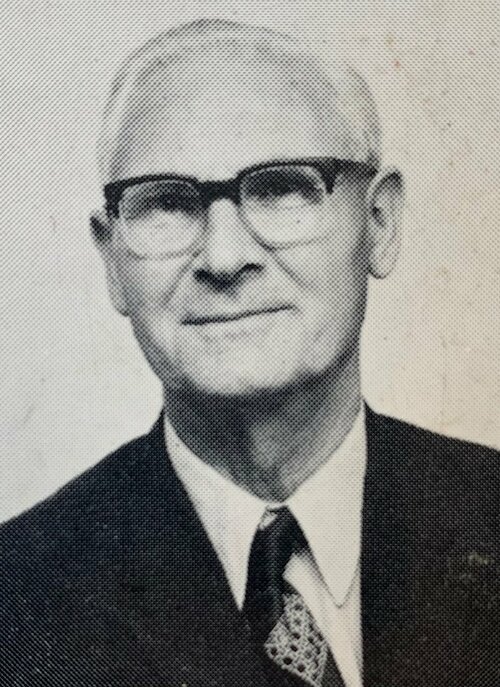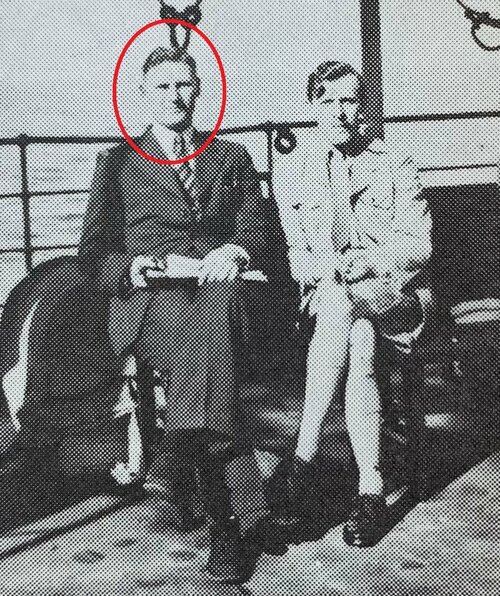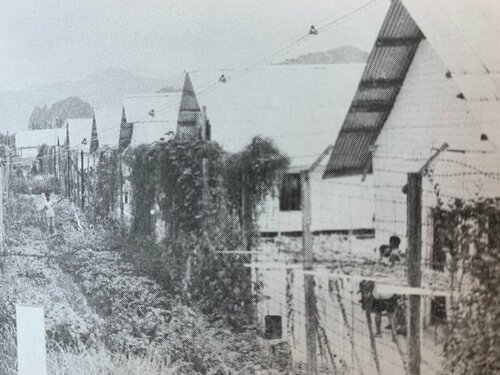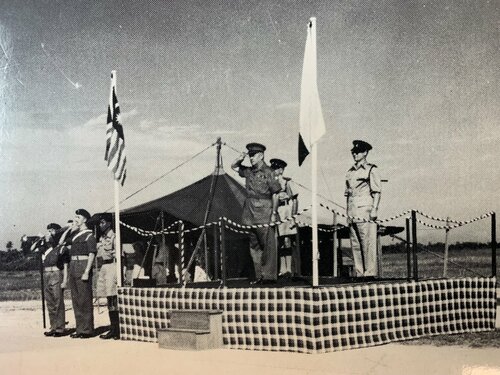Auction: 21003 - Orders, Decorations and Medals
Lot: 492
'Having served in two wars I have witnessed many examples of gallantry, mostly performed in the heat of battle, and not always requiring sustained effort, but I have never yet witnessed such an exhibition of extreme gallantry as displayed by Mr Hutchings on this occasion, which was a period of extreme strain from 7.50am until 2.30pm'
The Director of Prisoners, Accra.
A rare post-War G.M. awarded to Superintendent S. E. Hutchings, Ussher Fort Prison, Accra, Gold Coast, for his remarkable part in quelling the mutiny of some 600 prisoners
George Medal, G.VI.R. (Samuel Edgar Hutchings), on its original pin, minor official correction, nearly extremely fine, with card box of issue
G.M. London Gazette 1 June 1948. Major D.V. Henderson's G.M. Archive offers:
'Even farther West, on 29 February 1948, following disturbances in the town of Accra, Gold Coast, a mob of looters passed intoxicating liquor over the wall of Ussher Fort Prison and, later in the day, nearly 600 prisoners mutinied. Efforts were made by a Warder to persuade the prisoners to return to their cells, without success, meanwhile Superintendent S. E. Hutchings and another Warder, both off duty, went to the prison and forced their way through the hostile mob gathered outside the gates. Once inside the prison, he took charge of the staff of 30 Warders and, although the situation was such that the use of firearms would have been justified, he tried peaceful methods of persuasion. Later, when the mob outside forced the prison gates, releasing 200 prisoners, he and two Warders fought their way to the gates and succeeded in closing them and, additionally, were successful in recovering 50 prisoners. Without any thought for personal safety, Superintendent Hutchings then returned to the yard and, although he was struck on several occasions, he persisted in his efforts to pacify the prisoners, finally succeeding after a total of 80 hours. The two Warders were each awarded the B.E.M.'
Samuel Edgar Hutchings was born in Bradford and served in the Regular Army until joining the Prison Service in October 1930. After training at Portland Borstal Institution, he was posted to Feltham Borstal and afterwards served at H.M. Prison Wormwood Scrubs from 1942.
After the War, Hutchings transferred to the Colonial Prison Service, being posted to Ussher Fort and James Fort Prisons, Accra, on the Gold Coast, as a Prison Superintendent. Early on the Sunday morning of 29 February 1947, there were disturbances in Accra during which a store neighbouring Ussher Fort prison was looted. The mob passed crates of beer, wine and spirits over the wall to the inmates who consumed it without discrimination. The Warders on duty were quickly rendered powerless in face of the crowd of some 600 prisoners all of whom seemed eager to share in the spoils arriving 'by air'.
At 7.45 a.m. Hutchings was summoned by telephone from his bungalow and he set out at once for Fort Ussher undeterred by the hostile mood of looters along the way. Driving his car through the crowd that followed, he knew that if the car stopped, he would be mobbed by the crowd, indeed an Army Officer on the scene suggested '...you would not last two minutes.'
Hutchings was determined to stick to his duty and cooly made his way along, without mishap. At the prison he entered the yard, against the views of the Chief Officer whose view it was '...they are nearly all drunk and getting worse every minute, they will kill you.'
Hutchings again stuck to his work and attempted to restore order, as this was impossible he concentrated his efforts in preventing the Warders from any acts that would stoke the fire further. Meanwhile, the mob outside forced the main prison gates by sheer weight of numbers and, opening the inner gate, encouraged and aided the escape of about 200 inmates, before Hutchings and his few Warders inside the yard were able to close the exit and hold it against the 300 or so furious prisoners who had missed the opportunity to escape.
When the Director of Prisons arrived on the scene he was staggered to learn that Hutchings was inside the yard, as he 'considered that the consequences to any Officer in amongst that mob were extremely grave, and that the chances of his remaining, or being able to get out alive, were remote'. In due course, reinforcements arrived from a Warder Training Depot and the Director decided to contact Hutchings:
'I entered the yard only with the greatest of difficulty, preventing prisoners from rushing the gate as it was opened to allow me to enter. I found Mr. Hutchings extremely harassed by the yelling and shouting around him, but cool and completely fearless ... He informed me a military picquet had arrived shortly before with fixed bayonets and that the Officer in charge of the military patrol had fired his revolver in the air. With commendable courage and common sense, Mr. Hutchings had ordered the military patrol out of the prison in order to avoid bloodshed, and decided to handle the situation with such force as he had available'.
At length, and by persistence, he persuaded even the most mutinous of the prisoners in the yard to return to their cells without resorting to the tear gas and pick axe handles laid in by the Director. One moment recalled by Hutchings which perhaps turned the tide of the events that day was when he was set upon by a prisoner, who searched him head to toe without saying a word and said:
'You have not got a revolver?'
Hutchings replied 'Does your father carry a revolver when he is at home?'
'No' came the reply.
'Then why should I carry a revolver whenever I come to see my family. You and I know that bad children and naughty ones have to be punished when they do wrong, as you have, so punishment will come in due course; surely, when you do something bad at home you are not shot by your true father.'
This exchange was observed by the mob and it led to the eventual cooling of tension. Hutchings selected some twenty names of prisoners who obliged his requests and assisted in passing the message that the mutiny must stop. Some were granted immediate release whilst others have sentences reduced. Having put in his Report to the Government (which is reproduced in his book), Hutchings was Gazetted for a well-deserved G.M., which he received at an Investiture at Buckingham Palace on 2 November 1948. He was transferred to Malaya in 1951 - after having handed over control of Kumasi Prison to Nkrumah's new Government - to take over control of the Central Prison at Kuala Lumpur. In 1955 he was seconded to the Colonies Detention Camp at Ipoh, Central States of Malaya, he recalls coming face-to-face with a snake 'almost as thick as my neck, and easily fifteen feet in length.'
Rather than causing a commotion by pulling his revolver, the beast was dealt with by Hutchings and some Warders with stones which lay about. He found the next morning it had been sold into the Chinese medicine market. A few days later, 4 June 1955, he figured in a further serious incident concerning the killing of three Chinese detainees by gunfire. Following a serious riot which broke out, four Warders had opened fire with their rifles having seen comrades being mobbed and beaten in attempt to quell the riot. It transpired that 99 detainees had broken free, attacked their Warders and refused to enter their blocks. Attacking the Warders, they dragged some of them into the block, in either to kill or take them hostage. A Baton and Rifle Squad came out and Hutchings remained 'firmly convinced' they made clear the intention to break up the riot. He continues:
'I am certain that the first shot was fired over their heads of the unruly mob, and as this did not check the vicious attack, other Warders opened fire.
The Warders throughout acted with great courage in handling a most menacing and dangerous situation. In my opinion it was solely due to those who took the initiative to use firearms, that there was no loss of life amongst the staff.'
For his own part in the events of that evening, Hutchings was commended by the Commissioner of Prisons' Office. His final posting before retirement was at Seremban Prison. Hutchings wrote his memoir entitled Life in the Colonial Prison Service, whilst his wife penned the two-Volume work Every Road Leads Back Home, copies of which are included with the Lot.
Subject to 20% VAT on Buyer’s Premium. For more information please view Terms and Conditions for Buyers.
Sold for
£3,800
Starting price
£1900

